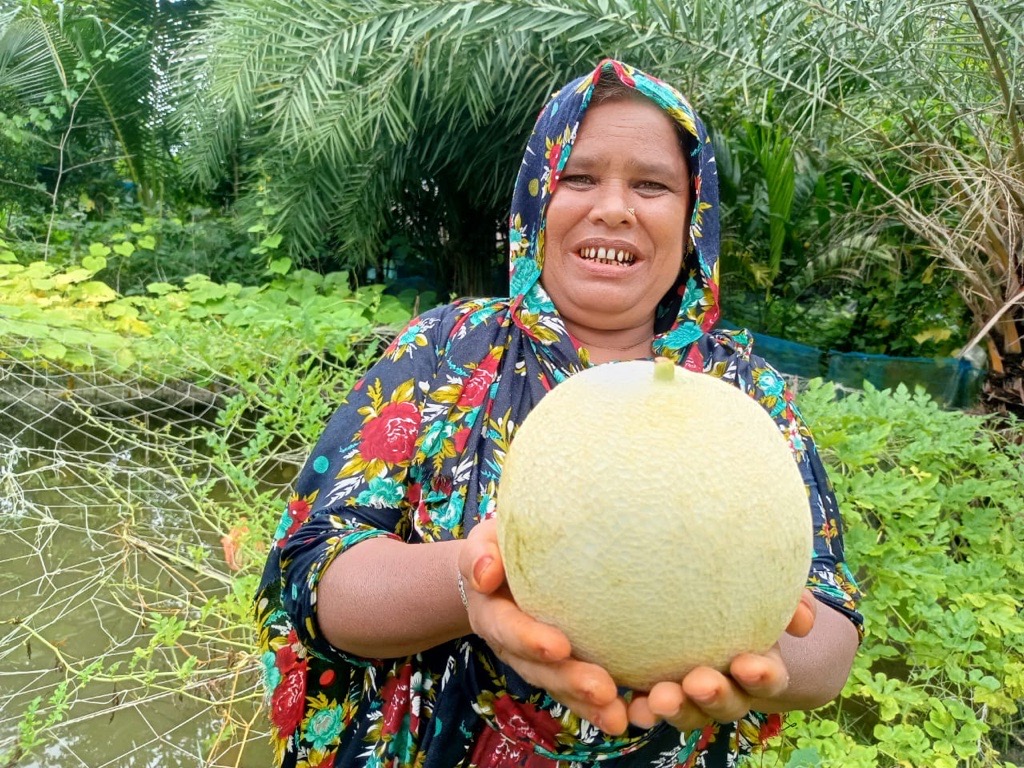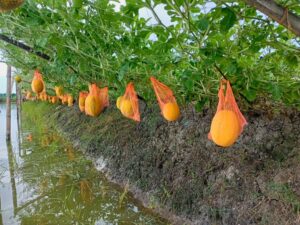
Growing watermelons and rockmelons out of season are transforming the lives of farmers in a coastal area of Bangladesh blighted by climate change. in the Khulna region of Bangladesh. The farmers’ inspiration is Romasa. The 47-year-old from Khulna region dared to do something different when increasingly salty soil made it impossible to grow traditional crops.
Romasa’s home village, Madabaria, is in one of the most climate-vulnerable areas of Bangladesh. Local farmers are grappling with a double whammy of climate change fallout – increasingly frequent and severe tropical storms that batter the coast, and rising sea levels that lead to destructive saltwater ruining previously fertile land.
Shaped by adversity
Romasa was born into a poor farming family, and life was a struggle from the start. Her father was unable to support his family and pulled her out of school at a very young age.
Like too many other girls in poor rural areas, Romasa was married off as a child and missed out on a proper education. Initially her husband earned a modest income through his small business. Romasa had 2 children in quick succession and managed to create a loving home. But what little happiness she found did not last.
When he was no longer able to find work locally, Romasa’s husband left for the city in search of employment. Days turned into weeks without him, then weeks into months. Eventually, Romasa learned the bitter truth; her husband had abandoned her and remarried, leaving her and their 2 young children to fend for themselves.
What followed was a downward spiral of hardship. Without a reliable source of income, Romasa struggled to provide for her children. She began working as a day labourer and, in more desperate times, became a household servant.
The whole family was forced to survive on just 2 meals a day. Romasa’s life was scarred by physical exhaustion and emotional despair as she carried the burden of her husband’s betrayal.
Then came the natural disasters. Severe cyclones and tidal surges brought with them a profoundly damaging influx of saltwater, further devastating the already fragile agricultural economy of Romasa’s village. Although there was no end in sight to her troubles, Romasa refused to give up hope.
Self-help and saving for a brighter future
Romasa’s path to change began when she joined a Self-help Group (SHG) organised through Islamic Relief Bangladesh’s ICRA project. Through group meetings, she learned how a combination of small individual loans and group savings could offer her a lifeline.
The loans Romasa received were modest. But they were interest-free, and enough to empower her to start rebuilding her life.
With her first loan, Romasa bought chickens and goats, gradually building up a small livestock business. As part of the project, she also received training in climate-adaptive agriculture, an innovative approach to farming that is designed to cope with challenges that are worsened by climate change.
Innovating for survival
Through the support of the ICRA project, Romasa was introduced to a new method of farming that would change her life and transform her entire community. She learned to grow crops like watermelon and rockmelon outside their usual growing season. These crops that had never been cultivated in her village before due to the salty soil.
Armed with training and technical support, Romasa was able to embrace new techniques and build earth dykes to grow melons on, creating raised plots of land that were less affected by saltwater.
The results were remarkable. Not only did Romasa manage to grow her crops successfully, but she was also able to sell them at a good price in the local market, thanks to their off-season availability. Her success inspired other women in her village to follow suit.
 Leading the way for other women
Leading the way for other women
Romasa’s transformation from a woman abandoned and left in poverty to a community leader in climate-adaptive agriculture is extraordinary. Her success has secured a better future for her family and opened doors for other women in her village.
Seeing Romasa’s success, more women have taken an interest in innovative farming practices, realising that they too can create a sustainable livelihood even in the face of extreme weather and poor soil conditions.
Romasa’s story is not just one of personal triumph. It is a powerful example of how access to knowledge, resources, and support can transform lives and build resilience in communities affected by climate change. Her journey shows the power of hope and collaboration, even in the harshest of conditions.
You can help empower women like Romasa to build a better future for themselves and their families. Your donation can help us equip communities to adapt to the huge challenges associated with climate change, supporting new livelihoods that enable people to thrive against the odds.
Donate today and be part of the change.



